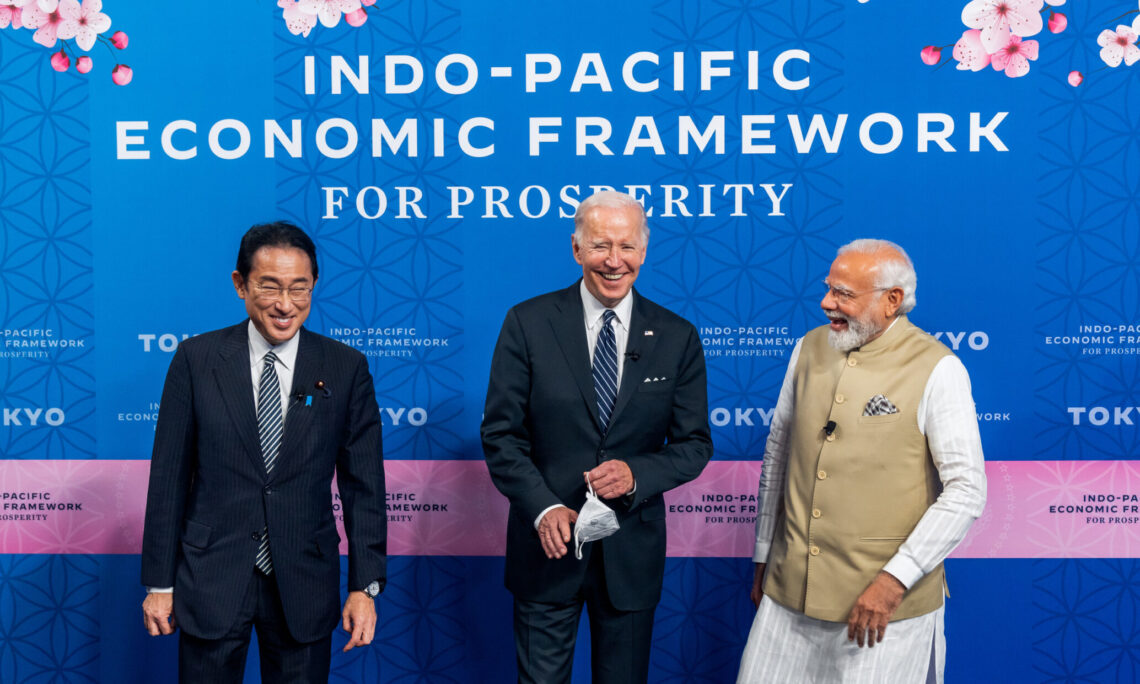The President’s (and USTR’s) Trade Agreement Authority: From Fisheries to IPEF
Congress regulates commerce with foreign nations, and the president makes treaties. Who then, has the first and last word on treaties related to foreign commerce?

Published by The Lawfare Institute
in Cooperation With

Editor’s note: This article was initially published at the International Economic Law and Policy Blog.
Over the last few years, separation-of-trade-law-powers questions have grown in importance. We know the basics: according to the Constitution, the regulation of commerce with foreign nations is expressly and unmistakably a congressional prerogative. Treaty-making, on the other hand, is a presidential power (of course subject to the advice and consent of the Senate). So, who has the first and last word on treaties related to foreign commerce? The question is complicated by the fact that, historically, congressional consent to trade agreements has come from both houses of Congress via legislation, rather than through Senate advice and consent—a procedure driven by the House of Representatives’ interest in protecting its role in regulating foreign commerce. Some thought the 1974 creation of fast-track authority—now called Trade Promotion Authority (TPA)—resolved the issue by establishing a special procedure for congressional review of agreements negotiated by the executive. Scholars debated the constitutional issues surrounding TPA decades ago and by now its constitutionality seems settled.
The issue today is not whether the full Congress must consent or only the Senate. Instead, the real issue is whether and when Congress’s consent is required at all. In recent years, the United States has entered into hundreds of trade agreements not approved by or subsequently implemented by Congress. What we appear not to know with certainty (or rather, what we still debate) is whether those trade executive agreements (TEAs) are legally permissible and, if so, how.
The most recent iteration of the conversation began in earnest around the time of the U.S.-Japan deals negotiated by the Trump Administration (but recall similar discussions around the so-called Anti-Counterfeiting Trade Agreement, among others). The buzz began on the Hill: could the Administration negotiate and conclude a trade-related deal without congressional approval? Initially, there was some discussion about authority in statutory delegations. For example, the Trump Administration invoked Section 103(a) of TPA 2015 (19 U.S.C. § 4202) to justify its bilateral tariff adjustments with Japan. That provision allowed the president to enter into trade agreements before July 1, 2021 and adjust tariff rates (but only tariff rates) accordingly, if he determined that duties or other import restrictions were unduly burdening and restricting the foreign trade of the United States. As deals were made around the Section 232 and 301 tariffs, we all re-read those statutes too to understand what the executive branch could or could not do.
At some point, however, the statutory delegations become harder to pin down. As one of us has noted, it is difficult to identify a delegation for many of the more than 1200 TEAs concluded in the last 40 years. Few of the statutes that agencies have cited when entering into those agreements could reasonably qualify as congressional consent—explicit or implicit.
Members of Congress have raised these concerns with the Biden Administration as it moves toward the Indo-Pacific Economic Framework (IPEF) and similar agreements, and they likewise raised them with prior administrations. With the Japan deal, for example, members questioned whether the rules of origin annex exceeded the president’s authority under Section 103(a). We have little detail about the contents of the IPEF but we are told that it will have binding and enforceable trade-related commitments. When Ambassador Tai was asked by the press “Does Congress vote on these or not?”, she said “let’s see where these negotiations take us”.
These difficulties extend to more conventional trade actions as well. Last month in Geneva, the United States entered into a “protocol” on fisheries subsidies, among other declarations and agreements, that by its terms amends the Marrakesh Agreement Establishing the World Trade Organization. In the past, TPA has provided a path to congressional approval of agreements negotiated under the auspices of the WTO. TPA expired last summer, however, so any congressional approval would have to come via ordinary legislation—putting these agreements’ legal status in the United States in doubt.
Despite the absence of TPA, the Biden Administration will continue entering into agreements that unquestionably regulate commerce with foreign nations and some of those agreements might be long and heavily substantive. So, we’re back to the central question: under what circumstances, if any, can the executive enter into such an agreement without congressional consent of any kind? Or put differently, must Congress consent to a trade-related agreement either before or after the executive signs it for that agreement to have force? We have heard three primary responses to these questions (a comprehensive list will be left for another day).
The first response that we often hear is that Congress has acquiesced to this executive branch practice; congressional silence means effective consent and there’s no turning back now. After all, look at the 1200 TEAs, these advocates say—Congress did not object to very many of those; ergo, it clearly has consented. This response is not very convincing for several reasons. For one, Congress does not know about many of these agreements due to transparency issues within the executive branch. The occasional legislative acceptance of TEAs is insufficient to create the quasi-constitutional custom that may exist elsewhere. Until recently, most members of Congress were not attuned to the vast expanse of the TEA landscape. The acquiescence argument carries even less weight in the context of far-reaching plurilateral or multilateral trade agreements: there are no examples of agreements of that sort coming into force without congressional consent.
The second response is one on which USTR principally relies in conversations with Congress. USTR argues that Congress has consented to USTR’s entrance into trade agreements based on the authorities delegated to it in its organic statute: 19 U.S.C. § 2171, originally part of the 1974 Trade Act. That statute provides that USTR has primary responsibility for the development of U.S. international trade policy. The statute also notes that USTR has “lead responsibility for the conduct of, and shall be the chief representative of the United States for, international trade negotiations”. Relying on this statute to justify USTR’s approach concedes that Congress must consent, but rather than referring to Congress’s silence, proponents here point to the organic statute as an implicit delegation not only to negotiate, but also to conclude agreements. Constitutional scholars may find that construing that language to permit USTR to enter into trade agreements poses nondelegation doctrine or major questions doctrine problems. Further, as noted above, Congress has expressly given and taken away trade agreement authority to and from the executive for more than a century—long before USTR existed—and every presidential administration has likewise sought congressional consent to enter into significant bilateral, plurilateral, or multilateral trade agreements since at least the 1970s. Relying on such an implicit delegation seems to go too far.
The third and most common response is that Congress has to approve only those agreements that change U.S. law. Under this view, Congress does not need to consent to agreements that do not require a change to federal statutes. This may be a variation on the acquiescence argument: Congress typically has not approved agreements that do not purport to change U.S. law, so why should it start now? Moreover, the executive can negotiate without congressional consent and enter into what we typically refer to as sole executive agreements, such as certain military agreements, without consent. Indeed, the Obama Administration took the position that it did not need congressional consent for at least some international agreements, including those that cover areas outside of trade, as long as it had the authority under general statutory delegations to implement U.S. commitments. At the same time, the Obama Administration also conceded that many of these types of commitments, such as those in the Iran Nuclear Deal and the emissions reduction commitments in the Paris Agreement, were non-binding, “soft law”, commitments.
This view rests on a constitutional division of power in which the president has a general foreign affairs power and Congress is responsible in the first instance for domestic matters. Although a common view in some circles, this division of authority defies the plain text of the Constitution when it comes to foreign commerce. If Congress has the power “to regulate commerce with foreign nations” and to “make all Laws which shall be necessary and proper for carrying into Execution” that power, then surely Congress has the right to choose the instrument through which it regulates foreign commerce, including by insisting on consenting to the creation of international commitments related to foreign commerce. Congress made this point as early as 1974 where, in at least a handful of statutes, it demanded that it must approve an agreement for that agreement to have effect under U.S. law.
Each of the last three administrations has entered into international agreements that lacked explicit congressional consent and rested on at best shaky claims of ex ante delegations of authority. Absent a course correction, future administrations, regardless of party, are sure to do the same. So, what can members of Congress do? We can come up with a list of things Congress could do but the better question is—what do members want to do? So far, the ideas behind IPEF and its siblings seem popular on both sides of the aisle—much like the WTO ministerial outcomes. Still, we’re only beginning to learn what the Administration is considering in form or substance for the upcoming negotiations, and, as noted, members are already demanding greater congressional involvement despite general support. Moreover, as tempting as it may be to let the executive get these deals done with minimal congressional involvement, doing so risks weakening the delicate institutional balance of authority. Tenuous claims of delegated authority are not limited to popular agreements.
There are also intersections between this discussion of congressional consent and congressional or executive implementation that may present both opportunity and risk. While there may be several options for working through those intersections, building consensus around the specifics is not easy. More work is needed to determine whether any of the potential options makes sense for this moment or whether they would manage sufficiently the inter-branch relationships, especially with an eye to future administrations that may wish to take the foreign commerce authority more fully into their own hands.
UPDATE: On April 11, 2023, U.S. Trade Representative signed the U.S. instrument of acceptance of the WTO Agreement on Fisheries Subsidies. The Agreement, in its final form, is styled as a Protocol Amending the Marrakesh Agreement Establishing the WTO. Amendments to the WTO Agreement are at least partially addressed by a different statute than that described above for plurilateral WTO agreements. The statute requires USTR to consult Congress before any vote is taken in relation to any amendment, but it does not speak to USTR's ability to enter into an amending protocol. Voting by WTO members (or the members of any international organization) to adopt an amendment, though, is a distinct legal act from individual members accepting the amendment. Failing to collectively adopt an amendment would prevent any country from individually accepting the amendment, but it does not compel acceptance by individual members.






